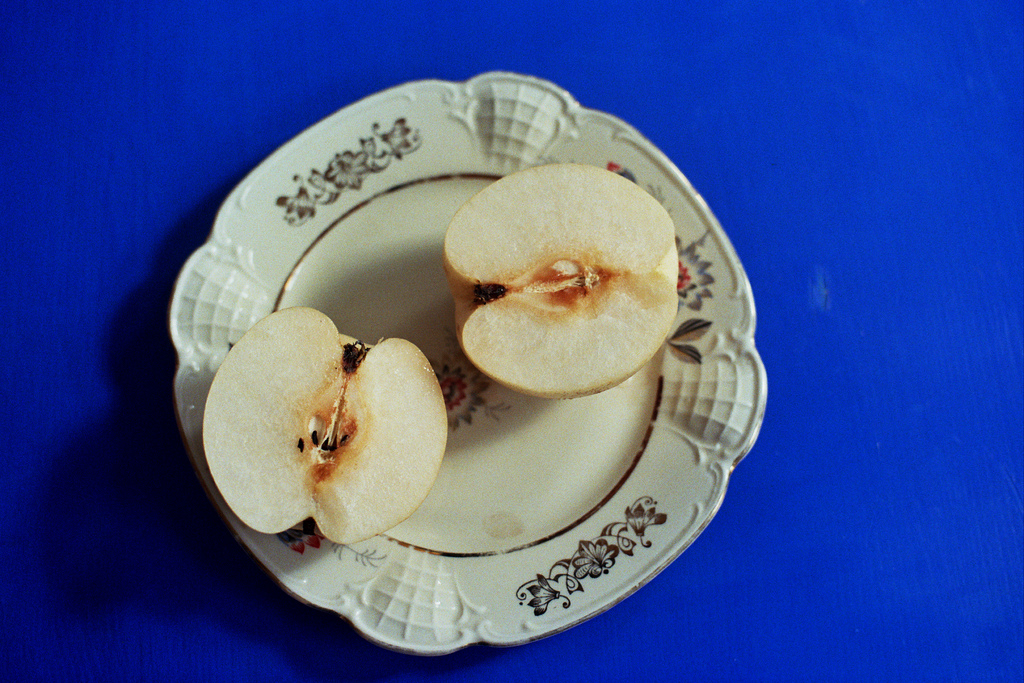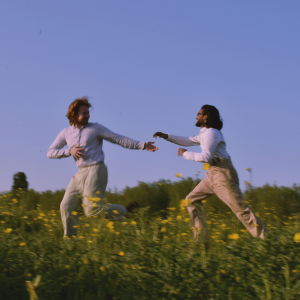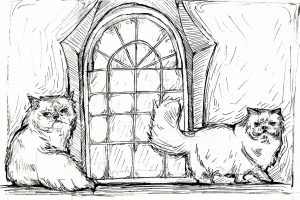
Zoos
by Charlotte Pence | March 5, 2015
In Memoriam R. S. Thomas
I tell Genevieve Cooper about the world every Tuesday at three. She lives at the top of a hill outside of town and everyone assumes that she has some nurse up there who helps her out, but that isn’t true. She’s lived there since her husband died when she was in her forties and she didn’t want to be downtown anymore. I grew up with her babysitting me and she was the one who once insisted I go on a date with the woman who would later become my wife. She was a counsellor to our family, a confidante, a sage. She moved from the city because she didn’t want to be reminded of the little shops she and her husband used to go in, and the restaurants they used to eat at. I understand that about her. I understand a lot of things about her.
She’s in the second chair from the window when I walk in. The cottage, dark and warm, seems to invite me inside and I’m reminded of the same feeling I used to get after coming home from a particularly brutal day at school during my teenage years. Genevieve’s eyes pretend to scan the world outside, but they hardly see anything now. She wouldn’t admit the decline of her health for years, but being well known in a small town means that people start to notice the small changes; the postman begins to wonder why the stamps are being put on upside down. Eventually the town authorities arranged my weekly visits. Everyone agreed that it was better than putting her in a home. Nobody wanted to see the woman who had watched them grow up locked away in a place where her days were scheduled and her meals regulated.
“Danny? Is it you?”
“It is, Gennie.” I cross the room towards her. I’m always tempted to make a joke about whom else she is expecting, but a part of me is afraid to hear the answer. I’m not sure if I’m more worried about knowing that she has someone else coming in, another friend of hers, an additional member of our previously private club, or hearing her admit that no, no one was coming.
I sit opposite her. The chair faces towards the fire and not the window, so I can’t even pretend that we’re looking at the same things, noticing the same funny little habits of the animals scurrying out of the starting rain or the far-off cars beginning to slow as they turn their windshield wipers on.
“So how are things?” I ask.
She moves her head slowly in my direction and the grey light from outside catches her white hair like the flash of headlights on a dark night, coming around a bend with no warning and no time to react. I blink.
“Fine,” she smiles. “Just fine.”
She moves slowly as she speaks and I’m reminded why the people of our town have always been so drawn to her. Her composure is reminiscent of a polar bear, strangely appreciative of her surroundings. I never get the impression that polar bears are unhappy as I do with lions. Lions seem to be constantly thinking about their former lives, whereas polar bears are more accepting. They endure their state of captivity with grace. Or is it indifference?
Genevieve touches the ends of her hair thoughtfully.
“Now, you tell me, are you still working at the farm?”
The only time I have ever been to a farm was in high school on a trip to the country when the teacher chose me as an unwilling volunteer to milk a cow. To my teenage horror, she remarked at how skilled I was with my ‘gentle, steady technique’ and I had spent the following years being mocked with lazy jokes from my fellow classmates. I have no intention of working on a farm again.
“Yes,” I reply. “The farm is going very well.”
“This winter will be a harsh one.”
“That’s true. That’s true enough.”
She shifts in her chair.
“Mr. Harding’s store probably needs a lot more help these days. Don’t you help out there on weekends?”
Mr. Harding died twenty years ago from a bee sting. “Occasionally.”
“Good. That’s very good of you.”
We sit there for a while in silence, just dwelling together. I think of how this is enough for Genevieve Cooper and I envy her for a moment. I try and see her as she used to be, surely running errands with a smile, cooking a different dinner every night, keeping up with the news of the town. Her mind slows a little more each day now and her eyes don’t help her see the world anymore, but still she is content to simply sit next to another person with no agenda and no benefit. I wonder when I will get that back.
“Oh—how rude of me,” she says. “Would you like any tea? I believe I’ve just put some on…”
Knowing that she has not put any on, seeing as she is not permitted to own an oven, but rather has her meals delivered daily by different volunteers, I politely decline the tea, admit that I am not really a caffeine drinker.
“I see. You know, last week James came through on the train and I think he was a little ill. Would you go by and see him next week?”
I have no idea who James is or was, but I tell her it would be my pleasure.
“So how’s your lovely wife?” She turns her head slightly in the direction of my voice.
My flinch goes unnoticed by her blind eye. This question always comes at some point in our talks and yet it never fails to cause my throat to constrict. I swallow and answer the same way I always do.
“She died, Gennie.”
“Well, that’s nice to hear.” Her smile remains the same way it was when I walked inside. She continues to stare out the window, unaware of the rain and the storm sure to follow. For a moment, I wish I could see the scenes playing out in her mind, the imaginary world in which she lives. I wonder if it is a sunny day there. I wonder if she sees us walking there, up the hill to her house like we used to.
I nod, realise she can’t see, and reply, “Right.”
“Well, good. You need to make sure she rests, Danny boy, what with a baby on the way.” She nods contentedly as she talks, looks in my direction as if something caught her eye. Maybe she felt some shift in the air; maybe she could faintly hear my heart beat a little faster.
“So what’s new out there, Danny? You are my eyes, after all.” She laughs at this.
So I tell her that the cows are still grazing in the fields outside and there is a town Christmas party being planned. I tell her that the milkman was late today and the Girl Scouts are running smoothly in their first year coming to our town. These were real aspects of her prior world, the one that she can remember, and so I keep with these patterns and traditions. It seems wrong to steal memories from an old lady, especially when those memories are the ones of my dreams, the shadows that scatter each morning I wake.
She nods as I talk and then adds, “You really must bring your wife by again.”
I sigh. “I will. I promise.”
“I’ll see you next week then?”
“Next week. I’ll be here.”
“I look forward to it, Danny.”
I get up and walk to the door, but turn back as she calls to me.
“Danny?”
“What is it, Gennie?”
“I’ve just had this horrible thought.” Her face is slightly crumpled and I watch as some truth breaks through. There’s no way for me to know which reality it is that torments her, but I move towards the chair and place a hand on her arm. She covers it with hers.
“You’re probably just remembering a bad dream, Gennie. Sometimes that happens to me. I don’t remember it until much later in the day. But that’s all it is—just a dream.”
She nods, unsure. “Yes, Danny. Yes, that must be it.”
I pat her hand and stand up.
“Are you all right?”
“Yes,” she says. “Yes.”
I move towards the door. Thinking again, I spin around and plant a kiss on the top of her head.
“Aw, Danny. You’re too sweet. You will break hearts when you’re older, for sure,” she says, staring blankly at the windowsill, back to normal.
I walk down the large hill and into the city centre. I dodge the few buses taking the last of the office workers home at the end of the day. I haven’t driven a car for years and I take a breath as the blare of horns starts in the afternoon traffic. I walk to a café and order a pot of tea. The café is closing in half an hour but I like putting off going home. I sip the cold tea and wonder if I should ask the barista to warm it up.
I glance up towards the hill from where I’ve just come. I try to imagine my nice friend, Genevieve Cooper, sitting alone by the window, believing herself to be looking out at a world much different than the one in which she lives. I think of her waiting for me every Tuesday at three o’clock and I wonder for a moment if she really does wait for me. Or does she just happen to be sitting there at the same time each week, pleasantly surprised when I walk through the door?
Image by ivana klickovic




